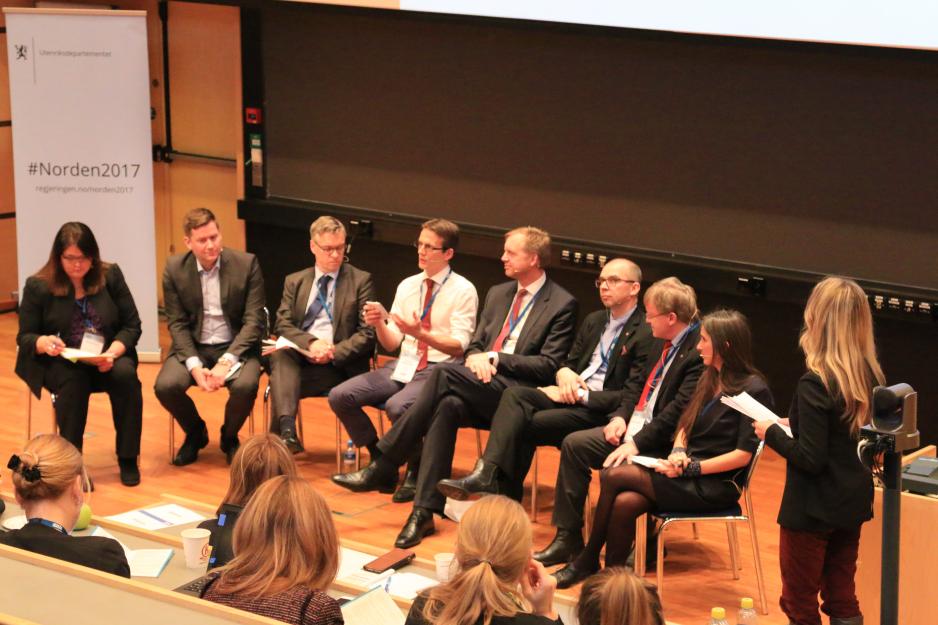The Nordics: Innovative leaders on the way to a green economy

The Nordic countries constitute one of the most innovative regions of the world and have the potential to lead the transition to a green economy. To achieve this, they need to strengthen partnerships, not only among the Nordic states, but also on a broader scale internationally.
For the kick-off of the Norwegian presidency of the Nordic Council of Ministers in 2017, Hilde Sandvik, chief editor and founder of the media platform Broen.xyz, moderated a session on the Nordic states’ innovativeness.
Even though it is already highly integrated, "the Nordic Council of Ministers is working to make the Nordics one of the most integrated regions and to make sure that there are no barriers between Nordic countries", asserted Karen Ellemann, Minister for Equal Opportunities and Nordic Cooperation of Denmark, at the conference session.
However, the integration among the Nordic states is not enough, warned Margot Wallström, Sweden’s Minister of Foreign Affairs and Nordic Cooperation:
“In these times of global insecurity, enhanced international cooperation is more important than ever. Cooperation is important for others to listen to what we have to say."
Trust and shared values as basis for innovation
Frank Bakke-Jensen, Norway’s Minister of EU-Affairs and Nordic Cooperation, referred to the integration of the Nordic states’ economies. Thanks to "shared values, which provide an unique opportunity to tackle challenges", he said, the region is also one of the most innovative.
According to Ellemann, the Nordic states’ many shared fundamental values and commonalities include the small, open economies’ benefits from free trade and globalization; working to ensure sustainable and competitive communities; welfare systems that protect equal access to health, education, and social safety; and the respect for democracy, differences and equal rights and opportunities.
Nordic companies reap the benefits of these "great solutions and great brand" when doing business abroad. Together, the Nordic states are Europe’s fifth largest economy and often top the world charts: best to do business in, most competitive and innovative, and happiest in the world.
Nordic cooperation for a successful north
To lay the best possible foundations for a thriving economy, Senior Adviser to the Nordic Council of Ministers Nauja Bianco announced that the Council will investigate the adequacy of the current framework for entrepreneurship and innovation.
Another participant at the conference session, Niklas Nordström, deputy mayor of the Luleå Municipality and Chairman of BusinessSweden, emphasized the importance of Nordic cooperation for businesses and the northern regions:
"We really need the Nordic cooperation to be successful, because we need the support from our governments and from the Nordic level to be successful."
He underlined that the universities in the Arctic are crucial for the future of the region, which is why assisting them is "extremely important if we want to be successful, live here, and work here."
Transition to a green economy
The session’s emphasis of the transition to a green economy and sustainable development was endorsed by all speakers.
"The Nordics have the potential to become a leading region in the transition to a green economy", said Dagfinn Høybråten, Secretary General of the Nordic Council of Ministers.
Referring to sustainable development, which is often characterized by the ‘three Ps’ People, Planet, Profits, Bianco affirmed the importance of cooperation for greening our economy: "We should add a fourth P, Partnerships, which is also the 17th goal of the United Nations Sustainable Development Goals."
However, she draws attention to the local level: "We often refer to the capital cities of the Arctic states, but we should think more in terms of local solutions, a bottom-up approach. The Nordic countries have the tradition of being very inclusive."
The building of partnerships should also include social sciences. Wallström acknowledged: "We should invite psychologists to our discussions on climate change" to work on what has taken us so long to act on the science of climate change.
"We have a problem picturing climate change as the enemy. We think it’s not us, not now, not here. But that’s not true, as the Sámi can tell us."
Sustainable tourism
One of the most important industries at the moment is tourism. Arne Trengereid, business professor at the Arctic University of Norway (UiT), explains that there has been an explosive growth of tourism in the three Nordic countries. In order to prolong this successful, rapidly developing Arctic tourism project, "politicians have to put tourism higher on the daily and political agenda."
There is also the need to develop the infrastructure according to the growth in the industry. "We will not manage this, if we don't cooperate closer", Trengereid concludes.
Hilde Sandvik, speaking of the intense marketing of the region’s nature and northern lights and linking tourism with a "green" economy, summarized the session by quoting Amy Larkin, Vice Chair of the World Economic Forum’s Global Agenda Council on Climate Change: "Nature means business."
A video of this Arctic Frontiers session "The Nordics a driving force for innovation in the Arctic?" below the ad:
